Learning a new language is quite challenging, but there are ways to make it easier. Initially, start with the basics, don’t skip this level. There are numerous Basic Japanese words that you should study and memorize first to begin a quick conversation.
To lessen the struggle in memorization, here are some tips: read out loud, write the words, and associate new words with words that sound similar in your native language.
If you plan to travel, work, or live in Japan, you have to consider the lists of Japanese words below, which include romaji and pronunciation.
Greetings in Japanese
A greeting is essential because it established a connection to other people. Japanese greet each other by bowing instead of shaking hands.
Let’s take for example the right way to say “hello” in Japanese.
Good Afternoon
Pronunciation: Kohn-nee-chee-wah
- This can also be used as saying hello at any time of the day.
Hello Over the Phone
もしもし Moshi Moshi
Pronunciation: Moshi Moshi as mosh mosh
- It’s a greeting used over the phone, more appropriate than Konnichiwa.
Remember, do not use this to greet a person.
Informal Greeting
おっす Ossu
Pronunciation: ohss
- Ossu is equivalent to say “hey, man!” or “hey, dude!” in English.
Good Morning
おはよう ohayō gozaimasu
Pronunciation: oh-hah-yoh goh-za-ee-muss
- You can use Konnichiwa but ohayō gozaimasu is more standard.
Shorten way to say it, ohayō
Good Evening
こんばんは konbanwa
Pronunciation: kohn–bahn-wah
- Standard greeting during the evening.
Good night
Good night
おやすみなさい oyasumi nasai
Pronunciation: oh-yah-soo-mee nah-sigh
- Usually used to say goodbye at night instead of saying Konnichiwa.
Question Words in Japanese
Asking questions is very important in every conversation. Let’s learn the specific question words in Japanese.
- What?

何?Nani?
Pronunciation: Nah-nee? - Where?
どこ? Doko?
Pronunciation: Doh-koh? - Who?
誰?Dare?
Pronunciation: Dah-reh? - When?
いつ? Itsu?
Pronunciation: Eet-soo? - Which?
どれ? Dore?
Pronunciation: Doh-reh? - Why?
どうして Dōshite
Pronunciation: DOHH-sh’teh? - Why? (informal)
なんで? Nande
Pronunciation: NAHN-deh? - How?
どうやって? Dōyatte
Pronunciation: DOHH yaht–teh? - How much?
いくら? Ikura?
Pronunciation: Ee-koo-rah? - What type of?
どんな? Donna?
Pronunciation: DOHN-nah?
The common way of asking questions in Japanese.
- What’s wrong?
どうしたんですか。
Doushitan desu ka?
- How’s the weather?
天気はどうですか。
Tenki wa dou desu ka?
- Are you hungry?
お腹が空いていますか。
Onaka ga aite imasu ka?
- What is this?
これは何ですか。
Kore wa nan desu ka?
- How do you call/say this in Japanese?
日本語でこれは何と言うんですか。
Nihongo de kore wa nanto iun desu ka?
- Whose is this?
これは誰のですか。
Kore wa dare no desu ka?
- Who is that?
あの人は誰ですか。
Ano hito wa dare desu ka?
- How much is this?
これはいくらですか。
Kore wa ikura desu ka?
- What do you do in your free time?
暇の時に何するんですか?
Hima no toki ni, nani surun desu ka?
Say “Thank You” in Japanese
Thank you very much. (formal)
どうもありがとうございます。Dōmo arigatō gozaimasu.
Pronunciation: DOHH-moh ah-REE-gah-tohh goh–zahy–mahs
Thank you (less formal)
ありがとうございます。Arigatō gozaimasu.
Pronunciation: Ah-REE-gah-tohh goh-zahy-mahs
Thank you (normal)
ありがとう。 Arigatō
Pronunciation: Ah-REE-gah-tohh
Thanks (informal)
どうも。Dōmo.
Pronunciation: DOHH-moh
Refer to People in Japanese
- male
おとこ、男 otoko
- man
おとこのひと、男の人 (otokonohito) - boy
おとこのこ、男の子 otokonoko
- female
おんな、女 onna - woman
おんなのひと、女の人 onnanohito - girl
おんなのこ、女の子 onnanoko - baby
あかちゃん、赤ちゃん akachan - I, myself
わたし、私 watashi
- I, myself (used for males)
ぼく、僕 boku,
- I, myself (used for males [informal])
おれ、俺 ore,
- I, myself (used for females [softer sounding])
あたし、私 atashi,
Family Members in Japanese
- family
かぞく、家族 kazoku
- parents
りょうしん、両親 ryoushin
- children, child
こども、子供 kodomo
- father
ちち、父 (chichi) “otou-san” - mother
はは、母 – (haha) “okaa-san” - wife
つま、妻 – tsuma - husband
おっと、夫 – otto - older brother
あに、兄 – (ani) (onī-san) - older sister
あね、姉 – (ane) (onē-san) - younger brother
おとうと、弟 otōto - younger sister
いもうと、妹 – imōto - brothers
きょうだい、兄弟 siblings kyōdai - sisters
しまい、姉妹 shimai - grandfather
そふ、祖父 – (sofu) (ojii-san) - grandmother
そぼ、祖母 – (sobo) (obaa-san) - grandchild
まご、孫 – (mago) - uncle
おじ、伯父、叔父 – (oji) (oji-san) - aunt
おば、伯母、叔母 – (oba) (oba-san) - cousin
いとこ、従兄弟、従姉妹、従兄、従弟、従姉、従妹 (itoko) - niece
めい、姪 mei - nephew
おい、甥 oi
Days of the Week in Japanese
Sunday
にちようび、日曜日 nichi-yōbi
Monday
げつようび、月曜日 getsu-yōbi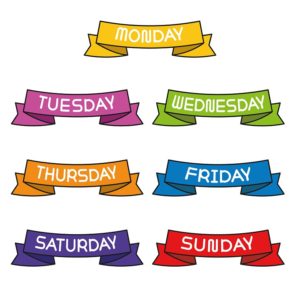
Tuesday
かようび、火曜日 ka-yōbi
Wednesday
すいようび、水曜日 sui-yōbi
Thursday
もくようび、木曜日 moku-yōbi
Friday
きんようび、金曜日 kin-yōbi
Saturday
どようび、土曜日 do-yōbi
Months in Japanese
- January
ichi-gatsu 一月
- February
ni-gatsu 二月
- March
san-gatsu 三月
- April
shi-gatsu 四月
- May
go-gatsu 五月
- June
roku-gatsu 六月
- July
shichi-gatsu 七月
- August
hachi-gatsu 八月
- September
ku-gatsu 九月
- October
juu-gatsu 十月
- November
juuichi-gatsu 十一月
- December
juuni-gatsu 十二月
The Four Seasons in Japanese
- Spring
haru 春
- Summer
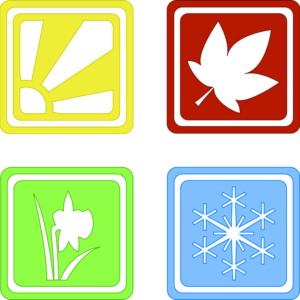
natsu 夏
- Autumn
aki 秋
- Winter
fuyu 冬
Parts of the Body in Japanese
- foot, leg
あし、足、脚 ashi
- heel
かかと、踵 kakato - chin
すね、脛 sune - knee
ひざ、膝 hiza - thigh
もも、腿 momo - head
あたま、頭 atama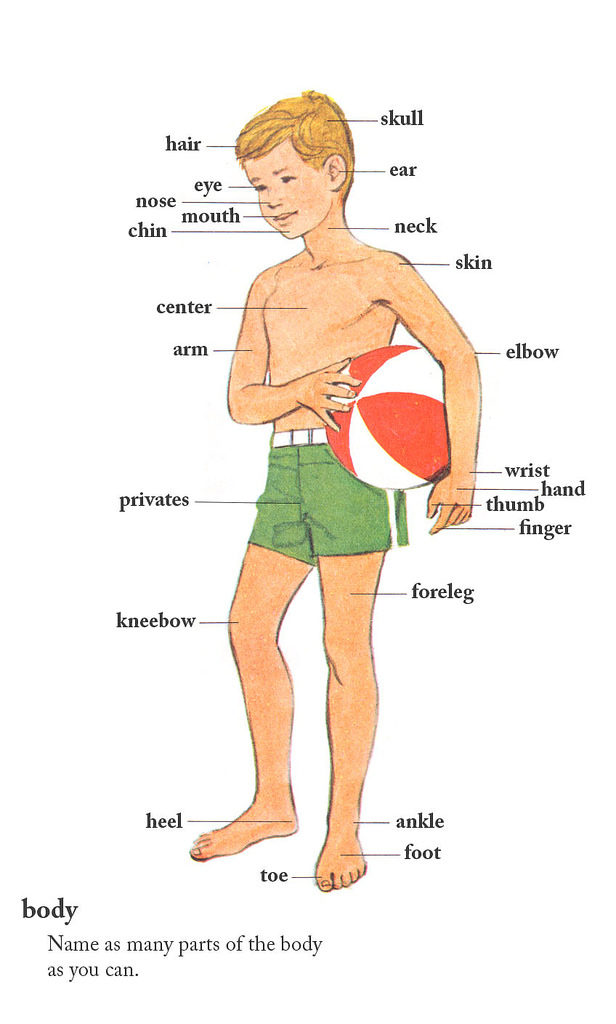
- face
かお、顔 kao - mouth
くち、口 kuchi - lips
くちびる、唇 kuchibiru - tooth
は、歯 – (ha) - nose
はな、鼻 – (hana) - eye
め、目 – (me) - moustache, beard
ひげ、髭、鬚、髯 – (hige) - hair
かみ、髪 – (kami) - ear
みみ、耳 – (mimi) - stomach
い、胃 – (i) - arm
うで、腕 – (ude) - elbow
ひじ、肘 – (hiji) - shoulder
かた、肩 – (kata) - nail
つめ、爪 – (tsume) - hand
て、手 – (te) - wrist
てくび、手首 – (tekubi) - palm of hand
てのひら、掌、手の平 – (te-no-hira) - finger, toe
ゆび、指 – (yubi) - buttocks
しり、尻 – (shiri) - abdomen
おなか、お腹 (はら、腹) – (o-naka) - liver
かんぞう、肝臓 – (kanzō) - liver
きも、肝 – (kimo) - muscle
きんにく、筋肉 – (kin’niku) - neck
くび、首 – (kubi) - heart [as in feelings]
こころ、心 – (kokoro) - waist, hip
こし、腰 – (koshi) - heart
しんぞう、心臓 – (shinzō) - back
せなか、背中 – (senaka) - blood
ち、血 – (chi) - meat
にく、肉 – (niku) - skin
はだ、肌、膚 – (hada) - skin
ひふ、皮膚 – (hifu) - bone
ほね、骨 – (hone) - chest
むね、胸 – (mune) - cold [illness]
かぜ、風邪 – (kaze) - diarrhea
げり、下痢 – (geri) - illness
びょうき、病気 – (byōki)
Different Types of Feelings in Japanese
Tired
疲れる (TsukareRu)
Sick
病人 (Byounin)
Cry
泣く (Naku)
Sad
悲しい (KanashiI) 
Hot
熱い (Atsui)
Hungry
空腹である (KuufukuDearu)
Cold
冷たい (TsumetaI)
Afraid
恐れる (OsoreRu)
Thirsty
喉が乾く (NodoGaKawaku)
Sleepy
眠い (Nemui)
Hunger
空腹 (Kuufuku)
Weak
弱い (Yowai)
Strong
強い (Tsuyoi)
Thirst
渇き (Kawaki)
Fear
恐怖 (Kyoufu)
Pain
痛み (Itami)
Shame
恥 (Haji)
Proud
誇りに思う (HokoriNiOmou)
Awake
目覚める (MezameRu)
Angry
立腹している(だれかに) (RippukuShiteiru(Darekani)) to be angry (with somebody)
Mood
ムード (Mu^do)
Panic
パニック (Panikku)
Upset
動揺 (Douyou)
Bored
詰まらない
Disappointed
失望 (Shitsubou)
Excited
興奮 (Koufun)
Interested
関心がある (KanshinGaaru)
Worried
心配する (ShinpaiSuru)
Angry
立腹 (Rippuku)
Basic Japanese Words and Phrases
- You’re welcome.
どういたしまして。Dō itashimashite.
Pronunciation: Dohh ee-tah–shee–mahsh–teh - Please. (request)
お願いします。 Onegai shimasu.
Pronunciation: Oh-neh–gahy shee–mahs - Please. (offer)
どうぞ。 Dōzo.
Pronunciation: DOHH-zoh -
Yes
はい hai
Pronunciation: Hahy - No
いいえ iie
Pronunciation: Ee-eh - Excuse me.
すみません。Sumimasen.
Pronunciation: Soo-mee-mah-SEN’ - I’m sorry.
ごめんなさい。 Gomen nasai.
Pronunciation: Goh-men-nah–sahy - I’m sorry. (informal)
ごめん Gomen.
Pronunciation: Goh-men’ - Goodbye. (long-term)
さようなら。 Sayōnara.
Pronunciation: Sah-yohh-nah-rah - Goodbye. (informal)
じゃね。 Ja ne.
Pronunciation: Jahh neh. - How are you?
お元気ですか? O-genki desu ka?
Pronunciation: Oh-GEN’-kee des-ka? - Fine, thank you.
はい、元気です。 Hai, genki desu.
Pronunciation: Hahy, GEN’-kee des. - How about you?
あなたは? Anata wa?
Pronunciation: Ah-nah–tah wa? - What’s your name? (lit. “Your name is…”)
お名前は? O-namae wa?
Pronunciation: Oh-nah-mah-eh wah? - My name is … .
… です。 … desu. (informal)
Pronunciation: … des. - My name is (Name) (formal)
私の名前は(name)です Watashi no namae wa (Name) desu
Pronunciation: wah-TAH-shee no nah-MAH-eh wah (Name) dess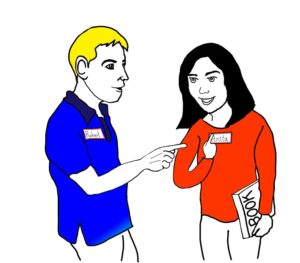
- My name is …. (honorific; highly formal)
と申します。… to mōshimasu.
Toh MOHH-shee–mahs, (means “I am called…”) - Nice to meet you. (formal)
始めまして。どうぞ宜しくお願いします。 Hajimemashite. Dōzo yoroshiku onegai shimasu Pronunciation: Hah-jee-meh-mahsh–teh DOHH-zoh yoh–rohsh–koo oh-neh–gahy shee–mahs - Please treat me well
よろしくお願いします。Yoroshiku onegaishimasu
Pronunciation: yor-OH-she-koo oh-nay-guy-ee-shee-mass - I can’t speak Japanese
very well.
日本語が(よく)話せません。Nihongo ga (yoku) hanasemasen.
Pronunciation: Nee-hohn’-goh gah (yoh-koo) hah-nah-seh-mah-sen’ - Do you speak Japanese?
日本語が話せますか? Nihongo ga hanasemasu ka?
Pronunciation: Nee-hohn’-goh gah hah-nah-seh-mahs kah? - Do you speak English?
英語が話せますか? Eigo ga hanasemasu ka?
Pronunciation: Ey-goh gah hah-nah-seh-mahs kah? - Is there someone here who speaks English?
誰か英語が話せますか? Dareka eigo ga hanasemasu ka?
Pronunciation: Dah-reh-kah ey-goh gah hah-nah-seh-mahs kah? - Yes, a little.
はい、少し。 Hai, sukoshi.
Pronunciation: Hahy, skoh-shee - Please speak slowly.
ゆっくり話してください。 Yukkuri hanashite kudasai.
Pronunciation: Yook-koo-ree hah-nahsh-teh koo-dah-sahy - Please say it again.
もう一度言ってください。Mō ichido itte kudasai.
Pronunciation: Mohh ee-chee-doh eet-teh koo-dah-sahy - I don’t understand.
分かりません。 Wakarimasen.
Pronunciation: Wah-kah-ree-mah-sen’ - I am not Japanese.
日本人ではありません。 Nihonjin dewa arimasen.
Nee-hohn–jeen deh-wah ah-ree-mah-sen’ - Where is the toilet?
お手洗い・トイレはどこですか? Otearai/toire wa doko desu ka?
Pronunciation: Oh-teh-ah-rahy/toy-reh wah doh-koh des kah? - Please help!
助けて! Tasukete!
Pronunciation: Tah-skeh–teh! - Look out!
危ない! Abunai!
Pronunciation: Ah-boo-NAHY! - Sorry, I didn’t understand that
すみません。分かりませんでした
(sumimasen. wakarimasen deshita)
- What did you say?
なんて言いましたか
(nan te iimashita ka?)
- Can you translate it for me?
訳してください
(yakushite kudasai)
- What does this mean?
これはどういう意味ですか
(kore wa dōiu imi desu ka)
- How do you pronounce that?
これはどんな風に発音しますか
(kore wa donna fū ni hatsuon shimasu ka)
- There’s a problem in the room
その部屋の中に問題があります
(sono heya no naka ni mondai ga arimasu)
- There’s no hot water
お湯がありません
(oyu ga arimasen)
- The tap/faucet is leaking
蛇口が漏れています
(jaguchi ga moreteimasu)
- The drain is blocked
排水溝が詰まっています
(haisuikō ga tsumatteimasu)
- The air conditioner is too noisy
エアコンがうるさすぎます
(eakon ga urusasugimasu)
- Can I have another room?
他の部屋へ移れますか
(hoka no heya e utsuremasu ka?)
- When should I vacate the room?
いつ、部屋を出なくてはなりませんか
(itsu, heya o denakute wa narimasen ka?)
- I’d like to check out
チェックアウトしたいのですが
(chekkuauto shitai no desu ga)
- I’d check out on this date
この日にチェックアウトしたいのですが
(kono hi ni chekkuauto shitai no desu ga)
- Could you call a taxi please?
タクシーを呼んで下さい
(takusī o yonde kudasai?)
- May I see the bill please?
請求書を見せて頂けますか
(seikyūsho o misete itadakemasu ka?)
- How much is the total bill?
請求書の合計額は、いくらですか
(seikyūsho no gōkei wa ikura desu ka?)
- Can I have an itemised bill?
明細書を見せて頂けますか
(meisaisho o misete itadakemasu ka?)
- I think there’s a mistake on this bill
この請求書に間違いがあるように思うのですが
(kono seikyūsho ni machigai ga aruyō ni omō no desu ka?)
- Is there a restaurant near here?
近くにレストランはありますか
(chikaku ni resutoran wa arimasu ka?)
- I’d like to reserve a table
テーブルの予約を取りたいのですが
(tēburu no yoyaku o toritai no desu ga)
- We have a reservation
既に予約をとっています
(sudeni yoyaku o totte imasu)
- Do you have an English menu?
英語のメ二ューはありますか
(eigo no menyu wa arimasu ka?)
- Can I see the wine list?
ワインのリストを見せて頂けませんか
(wain no risuto o misete itadakemasen ka?)
- I am a vegetarian 私は菜食主義者です
(watashi wa saishokushugisha desu)
Quick Self-introduction in Japanese
By using the words and phrases above, will help you begin a quick conversation with the Japanese people. You can start now by introducing yourself. Let’s practice the example below.
Hajimemashite. Konnichiwa. Watashi no namae wa (Name) desu. Yoroshiku onegaishimasu
Easy right? You could also learn the easy way to count in Japanese Numbers by clicking the link below.
Counting in Japanese Numbers 1-100 for Beginners
FAIR Japan provides useful information about Japan.


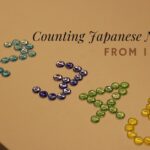

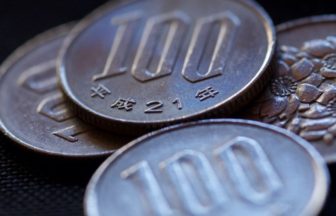


No comments yet.